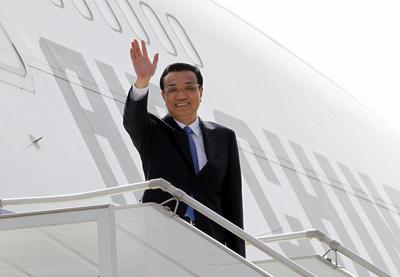Premier Li has called for striking a balance between long-term structural reforms and short-term economic growth.
President Xi Jinping recently asserted that GDP shouldn’t be the only way China’s economy is evaluated. This implies that the government will tolerate slower growth in coming years. While former Premier Wen Jiabao’s policy was to assure a growth rate of 8 per cent, Likonomics policy will slow the Chinese economy down. GDP growth rate in the first half of 2013 was reported to be 7.6 per cent, and though the goal set for 2013 is 7.5 per cent, it is said that the acceptable rate might be adjusted down to 7 per cent. According to Professor Yiping Huang, the term’s author, Likonomics could even allow a temporary ‘hard landing’ in the Chinese economy.
Professor Huang argues that just as Abenomics has three arrows, Likonomics has three pillars: no stimulus, deleveraging and structural reforms.
That these three pillars are needed to bolster the shaky domestic economy is not in dispute. China’s RMB4 trillion stimulus package, issued in 2008, had unintended consequences, exacerbating China’s overreliance on investment for growth. In 2011, for instance, investment contributed 54.2 per cent of GDP growth, while consumption contributed 51.6 per cent and decreased net exports were a drag on growth.
The government is beginning to change policy direction, reflecting Huang’s three pillars. Since coming to office Li has repeatedly warned that further government spending would increase risks to the economy. The Chinese central bank’s reluctance to intervene in the recent cash crunch was a sign that the government will come to the economy’s rescue less often from now on. Government intervention has long been a barrier to the healthy development of the Chinese economy and Li is trying to downplay the government’s role.
But there has been urgent rhetoric about the need for structural reform before — former Premier Wen Jiabao said famously that China’s economic development was unbalanced, uncoordinated and unsustainable. China will not enjoy a growing labour force for much longer, its substantial economy is weak, it has low energy efficiency and an unreasonable industrial structure, and it faces a glut of investment and an undersupply of consumer and export demand.
Meanwhile, the government realises that economic growth alone is not enough to satisfy the Chinese people. In recent years, people have recognised that official data, in particular GDP growth rate, does not necessarily reflect their concerns. These figures say little about issues that directly influence people’s everyday life — growing commodity prices, rarely changed salaries, the booming real estate market and the expanding income gap. In response, the government has pledged to focus on improving people’s wellbeing (minsheng).
It appears the term Likonomics may have been coined too hastily. Previous mélanges of the word economics with the names of political leaders — ‘Thatchernomics’ and ‘Reaganomics’ spring to mind — were based on long-term observation of those leaders’ achieved economic reforms. Even Abenomics is still a controversial phrase in Japan as its success is far from assured. Premier Li has been in office for just four months. It is far too early to summarise his policy into some doctrine.
Some believe that Li’s economics background will provide some reliability to his economic policy. In contrast to the engineering backgrounds of his predecessors, Li has a PhD in economics from Peking University. In 2010, when Li was leader of Liaoning Province, The Economist kept a ‘Keqiang Index’ of Li’s preferred three economic indicators: the cargo volume on the province’s railways, electricity consumption and loans disbursed by banks.
But there are enough reasons to doubt whether Likonomics will be put into full practice. China’s overreliance on government investment won’t be overcome in a short time. State-owned corporations will not allow equal competition for small- and medium-sized enterprises in the market. It is also difficult to imagine how the current economy could withstand the pain of a temporary ‘hard landing’: the party’s legitimacy will still depend on high GDP growth unless it can improve the welfare of common people within a lower-growth framework. In a transitional society that is already restless, critical economic problems could easily trigger social chaos.
In China, all economic issues are ultimately political ones. Vested interests, corrupted political power, stereotypes, all pose powerful obstacles to any reformist. Similar to Xi’s anti-corruption campaign, Li’s structural reforms face tremendous challenges within the party. So whether Likonomics will succeed or not remains to be seen.
Xie Zhihai is an assistant professor at Maebashi Kyoai Gakuen College and was previously a research associate at the Asian Development Bank Institute.


This is unconventional time and Likonomics would be unconventional in a sense.
Major developed economies, such as the US, ECB and British, all have been using unconventional monotary policies, almost unlimited money to stimulate their economies.
China, on the other hand, if the Likonomics is as portayed, is almost on the opposite. The brief but very sharp spikes of its inter-bank lending rates not long ago reflect such an interesting approach.
The danger of such an approach, though, could be in the difficulties that major developed economies face now; when the economy falls into a deep trouble it is difficult to get it back on track as their unconventional monetary policies and the limited effects suggest.
Economies are not always such a simple formula as some people might think. It would be a tragedy if a government engineered an economic crisis.